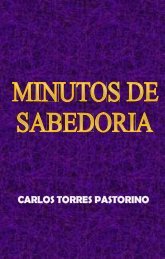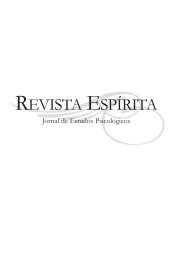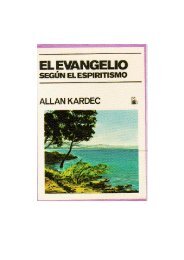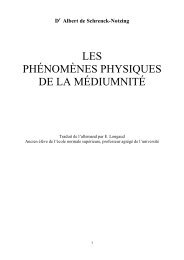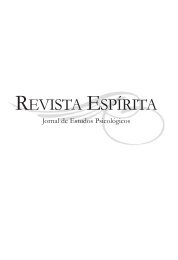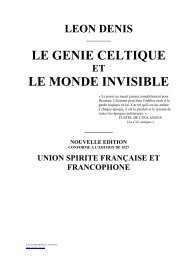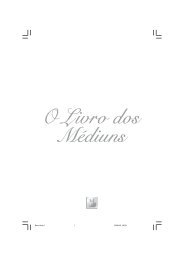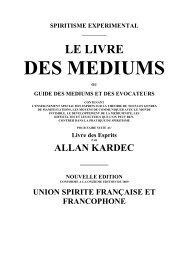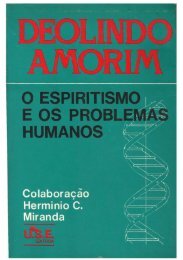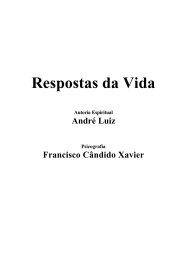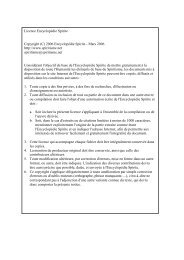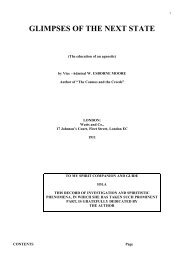- Page 1:
1! i.,^ilOlu,
- Page 7 and 8:
EXPERIMENTAL INVESTIGATIONOF THESPI
- Page 10 and 11:
»%a
- Page 15:
PLATE II.Description of the instrut
- Page 22:
PLATE IV.(x) The apparatus of which
- Page 26 and 27:
6 CONTENTS.Op CouNTEn-MEmuMSiiiP.
- Page 28 and 29:
8 CONTENTS.King of Persia, as contr
- Page 32 and 33:
Eixjravei at Hit:uu^ ''-/^u t^ Z?^.
- Page 34 and 35:
12 PREFACE.Could you sec the great
- Page 36 and 37:
14 PREFACE.the wise and good men of
- Page 38 and 39:
16 SUPPLEMENTAL PREFACE.SUPPLEMENTA
- Page 40 and 41:
18 INTRODUCTION.3. To convey a corr
- Page 42 and 43:
20 INTRODUCTION.15. I am under the
- Page 44 and 45:
22 INTRODUCTION.signed, and decrees
- Page 46 and 47:
24 INTRODUCTION.God, imploring that
- Page 48 and 49:
26 INTRODUCTION.60. It is admitted
- Page 50 and 51:
28 INTRODUCTION.three clcracnts abo
- Page 52 and 53:
30 INTRODUCTION.truthful, by the ev
- Page 54 and 55:
82 INTRODUCTION.diabolical ? It has
- Page 56:
34 INTRODUCTION.119. But independen
- Page 59 and 60:
INTUITIVE EVIDENCEOF THEEXISTENCE O
- Page 61 and 62:
THE EXISTENCE OP SPIRITS. 37times m
- Page 63 and 64:
THE EXISTENCE OF SPIRITS. 89the doo
- Page 65 and 66:
TITK EXISTENCE OF SriRITS. 41157. '
- Page 67 and 68:
THE EXISTENCE OF Sl'IRITS. 43spelle
- Page 69 and 70:
THE EXISTENCE OF SPIRITS. 45179. Th
- Page 71 and 72:
THE EXISTENCE OF SPIRITS. 47It was
- Page 73 and 74:
THE EXISTENCE OF SPIRITS. 49205. In
- Page 75 and 76:
THE EXISTENCE OP SPIRITS. 61LJ^mc o
- Page 77 and 78:
THE EXISTENCE OP SPIRITS. 53235. My
- Page 79 and 80:
THE EXISTENCE OF SPIRITS. 55249. As
- Page 81 and 82:
THE EXISTENCE OF SPIRITS. 57mcnccd.
- Page 83 and 84:
THE EXISTENCE OF SPIRITS. 59was prc
- Page 85 and 86:
THE EXISTENCE OP SPIRITS.Glhappens
- Page 87 and 88:
THE EXISTENCE OF SPIRITS.G3ment cea
- Page 89 and 90:
THE EXISTENCE OF SPIRITS. 65tlicmso
- Page 91 and 92:
TIIK EXISTENCE OF SPIRITS. 67The si
- Page 93 and 94:
THE EXISTENCE OF SPIRITS.G9bless yo
- Page 95 and 96:
THE EXISTENCE OF RPTRTTS. 71M-ith i
- Page 97 and 98:
THE EXISTENCE OF HPIRITS. 73338. ''
- Page 99 and 100:
THE EXISTENCE OF SPIRITS. 75this ca
- Page 101 and 102:
THE EXISTENCE OF SPIRITS, 77359. ^'
- Page 103 and 104:
THE EXISTENCE OF SPIRITS. 79mosj)hc
- Page 105 and 106:
THE EXISTENCE OF SPIRITS. 81383. "
- Page 107 and 108:
THE EXISTENCE OF SPIRITS. 83you of
- Page 109 and 110:
COMMUNICATIONS FROM THE SPIRIT AVOR
- Page 111 and 112:
COMMUNICATIONS FROM THE SPIRIT WORL
- Page 113 and 114:
COMMUNICATIONS FROM THE SPIRIT WORL
- Page 115 and 116:
COMMUNICATIONS FROM THE SPIRIT WORL
- Page 117 and 118:
COMMUNICATIONS FROM THE SPIRIT WORL
- Page 119 and 120:
COMiMUNICATIONS FllOM THE SI'IRIT W
- Page 121 and 122:
COMMUNICATIONS FROM THE SnillT WORL
- Page 123 and 124:
COMMUNICATIONS FROM THE SPIRIT WORL
- Page 125 and 126: COMMUNICATIONS FROM THE SPTRTT WORL
- Page 127 and 128: COMMUNICATIONS FROM THE SPIRIT WORL
- Page 129 and 130: COMMUNICATIONS FROM THE SPIRIT WORL
- Page 131 and 132: COMMUNICATIONS FROM THE SPIRIT WORL
- Page 133 and 134: •52G.COMMUNICATIONS FROM THE SPIR
- Page 135 and 136: COMMUNICATIONS FROM THE SPIRIT WORL
- Page 137 and 138: CONVOCATION OF SrilllTS. 113less on
- Page 139 and 140: CONVOCATION OP SPIRITS. 115504. (0.
- Page 141 and 142: CONVOCATION OF SPIRITS. 117691. (3G
- Page 143 and 144: EXPOSITION OP INFORMATION RECEIVED.
- Page 145 and 146: FROM THE SriRIT WORLD. 121is repres
- Page 147 and 148: FROM THE SPIRIT WORLD. 123events up
- Page 149 and 150: ArOLOGY FOR 1\IY CONVERSION. 125Can
- Page 151 and 152: APOLOGY FDR MV CONVERSION. 127visib
- Page 153 and 154: ArOLOGY FOR MY CONVERSION. 129G7G.
- Page 155 and 156: APOLOGY FOR MY CONVERSION. 181facts
- Page 157 and 158: APOLOGY FOR MY CONVERSION. 133matte
- Page 159 and 160: APOLOGY FOR MY CONVERSION. 135tloub
- Page 161 and 162: MORAL INFLUENCE OP SPIRITUALISM. 13
- Page 163 and 164: MORAL INFLUENCE OF SriRITUALTSM.lo9
- Page 165 and 166: THE HEAVEN AND HELL OF SriRTTUALISM
- Page 167 and 168: THE TTEAVEN AND HELL OF SriRITUALIS
- Page 169 and 170: THE IIEAVKN AND HELL OF SPIRITUALIS
- Page 171 and 172: THE HEAVEN AND IIKLL OF SPIRITUALIS
- Page 173 and 174: INSTINCTIVE IMPRESSION 149s'ulcred
- Page 175: TlIK TRUE DOCTRINE. 151775. AocorJi
- Page 179 and 180: THE TRUE DOCTRINE. 155body, cannot
- Page 181 and 182: THE TRUE DOCTRINE. 157and not from
- Page 183 and 184: OF MEDIUMSIIIP. 159than those who l
- Page 185 and 186: OP MEDIUMSIIIP. 161the aftirmativc,
- Page 187 and 188: OP MEDIUMSIIir. 163accordinj^ (o th
- Page 189 and 190: OF MEDIUMSIIIP. 1057x0=:-- 42 pound
- Page 191 and 192: OP COUNTER-MEDIUMSIIIP. 107disposed
- Page 193 and 194: OP SPIRITUAL MANIFESTATIONS. 169llc
- Page 195 and 196: OF SPIRITUAL MANIFESTATIONS. 171her
- Page 197 and 198: ALPHABETIC CONVERSE WITH SriRITS, E
- Page 199 and 200: AS NEW AS THE TELEGllAni. 175iuvcst
- Page 201 and 202: IN THE WORLD TO COME. 177tlio descr
- Page 203 and 204: MRS. gourlay's narrative. 170or sci
- Page 205 and 206: MRS. GOURLAY's NARRATfVK. 181at tho
- Page 207 and 208: isius. gourlay's narrative. 183943.
- Page 209 and 210: MRS. oourlay's narrative. 185wrltli
- Page 211 and 212: MRS. gourlay's narrative. 187OGl).
- Page 213 and 214: MRS. gourlay's narrative. 189it inc
- Page 215 and 216: MRS. gourlay's narrative. 191Bkctcl
- Page 217 and 218: PRACTICAL BENEFIT OF SPIRITUALISM.
- Page 219 and 220: PRACTICAL BENEFIT OF SPIRITUALISM.
- Page 221 and 222: PRACTICAL BENEFIT OF SPIRITUALISM.
- Page 223 and 224: PRACTICAL BENEFIT OP SPIRITUALISM.
- Page 225 and 226: PRACTICAL BENEFIT OF SPIRITUALISM.
- Page 227 and 228:
PRACTICAL BENEFIT OF SPIRITUALISM.
- Page 229 and 230:
MARRIAGE ON EARTH AND IN HEAVEN. 20
- Page 231 and 232:
ON THE MORALS OF CHRISTIANS. 207the
- Page 233 and 234:
ON THE MORALS OF CHRISTIANS. 209sui
- Page 235 and 236:
ON TlIK MORALS OF CIIIITSTIANS. 211
- Page 237 and 238:
ON THE MORALS OF CHRISTIANS. 213Tiu
- Page 239 and 240:
ON THE MORALS OF CHRISTIANS. 215wor
- Page 241 and 242:
ON THE MORALS OP CHRISTIANS. 217bo
- Page 243 and 244:
ON THE MORALS OF CHRISTIANS. 219con
- Page 245 and 246:
ON THE MORALS OF CIIIIISTIANS. 221w
- Page 247 and 248:
ON TIIE MORALS OF CHRISTIANS. 223gr
- Page 249 and 250:
ON THE MORALS OF CHRISTIANS. 225tli
- Page 251 and 252:
ON Tin: MORALS OF CHRISTIANS. 227It
- Page 253 and 254:
ON THE -MORALS OF CHRISTIANS. 220bo
- Page 255 and 256:
'ON THE MORALS OF CHRISTIANS 281119
- Page 257 and 258:
ON THE MORALS OF CIIRISTIANS. 233wl
- Page 259 and 260:
ON THE MORALS OF CHRISTIANS. 235tou
- Page 261 and 262:
ON THE MORALS OF CHRISTIANS. 237wit
- Page 263 and 264:
ON THE MORALS OF CHRISTIANS. 239124
- Page 265 and 266:
ON THE MORALS OF CHRISTIANS. 241sac
- Page 267 and 268:
ON THE MORALS OP CHRISTIANS. 243tia
- Page 269 and 270:
ON THE MORALS OF CHRISTIANS. 245The
- Page 271 and 272:
ON THE MORALS OF CHRISTIANS. 247128
- Page 273 and 274:
ON THE MORALS OP CHRISTIANS. 249The
- Page 275 and 276:
ON TIIK MORALS OF CHRISTIANS. 25112
- Page 277 and 278:
ON THE MORALS OP CHRTSTIANS. 253alt
- Page 279 and 280:
ON TIIK MORALS OF CIIIITSTIANS. 255
- Page 281 and 282:
ON THE MORALS OF CHRISTIANS. 257mul
- Page 283 and 284:
ON THE MORALS OF CHRISTIANS. 259pra
- Page 285 and 286:
ON THE MORALS OP CHRISTIANS. 261133
- Page 287 and 288:
ON THE MORALS OP CHRISTIANS. 263ido
- Page 289 and 290:
ON THE MORALS OF CHRISTIANS. 265mos
- Page 291 and 292:
ON THE MORALS OF CHRISTIANS.2G71367
- Page 293 and 294:
ON THE MORALS OF CHRISTIANS.2G91378
- Page 295 and 296:
ON THE MORALS OF CIIllISTIANS. 271i
- Page 297 and 298:
OF THE EXISTENCE OF SPIRITS. 273ADD
- Page 299 and 300:
OF THE EXISTKNCE OF SI'lIUTS. 275kn
- Page 301 and 302:
OF THE EXISTENCE OF SPIIUTS. 277nev
- Page 303 and 304:
OF THE EXISTENCE OF SPIRITS. 279141
- Page 305 and 306:
OP THE EXISTENCE OF SPIRITS. 281cop
- Page 307 and 308:
OP THE EXISTENCE OF SriRITS. 283tim
- Page 309 and 310:
OF THE EXISTENCE OP SPIRITS. 285rap
- Page 311 and 312:
OF TIIK KXISTKNCE OF «1'1111TS. 28
- Page 313 and 314:
OF THE EXISTENCE OF SPIRITS. 289rcc
- Page 315 and 316:
OF THE EXISTENCE OF SI'IIUTS. 291we
- Page 317 and 318:
OF Tin; EXrSTENCK OF SPIRITS. 293ti
- Page 319 and 320:
OP THE EXISTENCE OF SPIRITS. 295amo
- Page 321 and 322:
OF THE EXISTENCE OF SPIRITS. 297evi
- Page 323 and 324:
OF THE EXISTENCE OF SPIRITS. 299and
- Page 325 and 326:
OF THE EXISTENCE OF Sl'IllITS. 801f
- Page 327 and 328:
OF THE EXISTENCE OF SPIRITS. 303log
- Page 329 and 330:
OF THE EXISTENCE OF SPIRITS. *>05pe
- Page 331 and 332:
OF THE EXISTENCE OF SPIRITS. 307wit
- Page 333 and 334:
OF THE EXISTENCE OP SriRITS. 309sto
- Page 335 and 336:
OF THE EXISTENCE OF SriRTTS. 311it
- Page 337 and 338:
OF THE EXISTENCE OF SPIRITS. 313phi
- Page 339 and 340:
OP THE EXISTENCE OF SPIRITS. 315end
- Page 341 and 342:
OF THE EXISTENCE OF 8P1RITS. 317(lu
- Page 343 and 344:
OF THE EXISTENCE OP SPIRITS. 319scr
- Page 345 and 346:
OP THE EXISTENCE OP SPIRITS. 821tat
- Page 347 and 348:
OF THE EXISTENCE OF SPIRITS.ijZ6pur
- Page 349 and 350:
OP THE EXISTENCE OF SPrUTTS. 325sli
- Page 351 and 352:
OF THE EXISTENCE OF SPIRITS. 327n^
- Page 353 and 354:
OF THE EXISTENCE OF SPIRITS. 3291G4
- Page 355 and 356:
OP THE EXISTENCE OF SPIRITS. 331105
- Page 357 and 358:
or THE EXISTENCE OF SPIRITS. 066lii
- Page 359 and 360:
OP THE EXISTENCE OF SPIRITS. 335the
- Page 361 and 362:
OF TIIK EXISTENCE OF SPIRITS. 337wa
- Page 363 and 364:
OF THE EXISTENCE OF SPIRITS. 339the
- Page 365 and 366:
\OP THE EXISTENCE OP SPIRITS. 341"w
- Page 367 and 368:
OF THE EXISTENCE OF Sl'IIUTS. 343sc
- Page 369 and 370:
OF Tin: EXISTENCE OP SPIRITS. 345th
- Page 371 and 372:
OF THE EXISTENCE OF SriRITS. 347wha
- Page 373 and 374:
OF THE EXISTENCE OF SI'IUITS. 34017
- Page 375 and 376:
OF THE EXISTENCK OF KPIiUTS. 351spi
- Page 377 and 378:
OF THE EXISTENCE OP SPIRITS. 353and
- Page 379 and 380:
OF THE EXISTENCE OF SPIRITS. 355lar
- Page 381 and 382:
OF THE EXISTENCE OP SPIRITS. 357mad
- Page 383 and 384:
OF THE EXISTENCE OF SPIRITS. 359the
- Page 385 and 386:
OF THE EXISTENCE OF SPIRITS. 361lea
- Page 387 and 388:
OF MATTER, MIND, AND SPIRIT.3G3grea
- Page 389 and 390:
OF MATTER, MIND, AND SPIRIT. 365alt
- Page 391 and 392:
OF MATTER, MIND, AND SriRIT. 367the
- Page 393 and 394:
OF MATTER, MIND, AND SPIRIT.3G9whic
- Page 395 and 396:
OF MATTERj MIND, AND SPllUT.oilbe d
- Page 397 and 398:
OP MATTER, iMIND, AND SPIRIT. 373Ad
- Page 399 and 400:
OF MATTER, MINI), AND SPIRIT. 375dr
- Page 401 and 402:
Of MATTKR, MINI), AND SPIRIT. 377ra
- Page 403 and 404:
OF iMATTJ:il, MINI), AND SPIRIT. 37
- Page 405 and 406:
'1861OF MATTER, MIND, AND SPIRIT. 3
- Page 407 and 408:
OF MATTER, MIND, AND SPllllT. 38318
- Page 409 and 410:
OF MATTER, MIND, AND SPIRIT. 385187
- Page 411 and 412:
OP MATTER, MINI), AND Sl'lHIT. 387q
- Page 413 and 414:
OF MATTER, MIND, AND SPIRIT. 389elu
- Page 415 and 416:
OF MATTER, MINI), AND 8PIRIT. 391sp
- Page 417 and 418:
OP MATTER, MINI), AND SPIRIT. 393is
- Page 419 and 420:
OF MATTER, MINI), AND SI'IIUT. 3951
- Page 421 and 422:
RKLKHOUS ERIIORS Ol' MR. MAHAN. 397
- Page 423 and 424:
RELIGIOUS EllROllS OF MR. MAIIAN. 3
- Page 425 and 426:
RELIGIOUS ERRORS OF MR. MAIIAN. 401
- Page 427 and 428:
RELIGIOUS ERRORS OF MR. MAIIAN. 403
- Page 429 and 430:
iiELiaious j:rrors of mil mama.v. 4
- Page 431 and 432:
RELIGIOUS ERRORS OF MR. MAIIAN. 407
- Page 433 and 434:
RELiaiOUS ERRORS OF MR. MAIIAN. 409
- Page 435 and 436:
•;i:- "'RELiaiOUS ERRORS OF AlU.
- Page 437 and 438:
RELIGIOUS ERRORS OF MR. MAIIAN. 413
- Page 439 and 440:
RELiaiOUS ERRORS OF MH. MAIIAN. 415
- Page 441 and 442:
RELIGIOUS KIUloilS or MR. ^lAIIAN.
- Page 443 and 444:
RKLKilOUS ERRORS OF MR. MAIIAN. 419
- Page 445 and 446:
PAGAN FEARLESSNESS OF DEATH. 421PAG
- Page 447 and 448:
CONCLUSION. 423frioml and relation-
- Page 449:
CONCLUSION. 425pa^an.Yel., ^vhilc r
- Page 452 and 453:
428 APPENDIX.pious as those of my c
- Page 454 and 455:
430 APPENDIX.it may be seen in the
- Page 456 and 457:
432'APPENDIX.AIUIADAY'SSrECULATION.
- Page 458 and 459:
434 APPENDIX.additions the matter s
- Page 460 and 461:
436 APPENDIX.ties of matter. In suc
- Page 462 and 463:
438 APPENDIX.(Jerful powers may all
- Page 464 and 465:
440 APPENDIX.different polarities g
- Page 466 and 467:
442 APPENDIX.high extent, the only
- Page 468 and 469:
444 APPENDIX.25. Having stated my o
- Page 470 and 471:
446 APPENDIX.principles, pervading
- Page 472 and 473:
448 APPENDIX.a condensation over ea
- Page 474 and 475:
450 APPENDIX.in one circuit, the en
- Page 476 and 477:
452 APPENDIX.composition extending
- Page 478 and 479:
454 APPENDIX.radiation and contact
- Page 480 and 481:
456 APPENDIX.Difference hetween Fri
- Page 482 and 483:
458 APPENDIX.the nerves and muscles
- Page 484 and 485:
460 APPENDIX.paratively small; the
- Page 486 and 487:
Reply of iJirSpirits.'Tis not to or
- Page 488 and 489:
2 PAKTRIDGE & BRm^AN'S SPIIilTUAL L
- Page 490:
4 PARTRIDGE & BRirrAN's SPIRITUAL L




